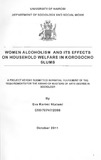| dc.description.abstract | Historically, it is said that alcoholism has been seen as a male disorder. Its treatment methods have been mostly tailored to men. Previous research has shown that substance abuse affects men and women differently. Of interest to this study was to critically annalyze how the woman's alcoholic state affects household welfare. The specific objectives of this study were to: establish the perception of women alcoholism in Korogocho slum, to access the effect of women alcoholism on childcare and upbringing, to understand the nature and extent of women alcoholism· in the slum, to investigate the effect of women alcoholism in the generation and management of household resources and finally to find out the strategies used in the community to deal with alcoholism in Korogocho.
The study was carrried out in the slums of Korogocho.
It combined aspects of both qualitative and quantitative designs. Key informant guides,Observation and Focus group discussions were used to supplement the data. Both alcoholic and non-alcoholic respondents were interviewed. A combination of content annalysis and thematic approach was used to annalyse qualitative data. Research findings indicate that the perception of women alcoholism is not accepted by society and is instead viwed as a problem. Societal expectations of women are linked directly to already prescribed roles such as wives, mothers, caretakers, nurturers and sexual partners. Therefore when a woman deviates from this already prescribed roles and takes up alcohol abuse they are stigmatised.
Other findings pointed out to the fact that women alcoholism does have direct drastic effects in the overall upbringing of children when it comes to their health, education, emotional well being as well as the generation of income and food security. The main conclusion is that women alcoholism has its effects on household welfare and as a result ofthis,the importance of treating the female alcoholic is paramount considering the prominent role she has in the home.
This study recommends that, communities take more action to control and eventually curb not only women alcoholism but alcoholism in totality. They must create more awareness campaigns, increase outreach and educational efforts that educate women on the harzards of alcohol. NGO's and development partners together with the government must put more concerted efforts in the general fight against alcoholism in Kenya.
The local chiefs who are the eyes of the government on the ground must stop taking bribes from local brewers at the expense of the human life. Finally, recommendations for further research should include more attention to gender differences in the design, analysis and reporting of drinking practices. In addition to this, research on the relationships between women's drinking and that of their
significant others can be considered. | en_US |

